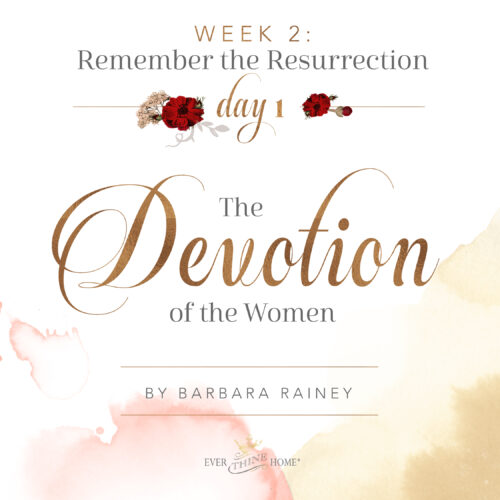
Is waiting something you enjoy and eagerly look forward to?
Not me!
When I think of waiting, I think of sitting in a doctor’s office waiting room. Or sitting in my car on the freeway, with traffic stopped dead and no exit nearby. Or standing in line at the department of motor vehicles for what seems like hours.
Waiting is not my favorite way to spend my time, but waiting does remind me I’m not in control. God’s ways are higher than mine, He knows circumstances I can’t see, and He even allows waiting for me and you to teach us patience for reasons we’ll never know.
But then there is a good kind of waiting that most of us enjoy, like waiting for Christmas, or the anticipation of a birthday or a wedding or a surprise of some type. This makes the moment much more significant.
Observing Lent, which starts next month with Ash Wednesday on February 14, is a way to anticipate Easter in much the same way we anticipate Christmas. Lent is to Easter what Advent is to Christmas; it’s a time to prepare and anticipate. Like Advent, Lent is also a great opportunity to lead your family in some kind of Bible study or for discipling you kids at home.

You may know a little about Lent—that it can involve “fasting,” that the Catholic community generally emphasizes it more than Protestants. But in recent years more and more Protestant churches have begun to incorporate Lent into their church calendar to help their members learn from the historic observance and to prepare to celebrate Easter. Personally, I’ve been observing Lent as a way to prepare for Easter for the last 10 years and it’s become a very meaningful season to help me prepare for the most important holiday of the year.
What is Lent?
Lent was established centuries ago by church leaders to help Christ followers remember the humility of Jesus and imitate Him as we are called to do. The word Lent means “the lengthening of days,” which refers to the steadily increasing time of sunlight we experience during Spring. The observance began during the apex of the Roman Empire in the infant years of the church.
The 40-day period between Ash Wednesday and Easter Sunday became infused with biblical meaning. It mirrors the 40 days Jesus spent fasting in the wilderness, the 40 days and nights of rain during the flood, the 40 days Moses spent on Mount Sinai, and the 40 days Jesus walked the earth between His resurrection and His ascension.
Lent officially begins with simple somber church services on Ash Wednesday. Its purpose is to call us to repentance, and it’s marked by the application of ashes to the foreheads of worshippers who choose to come forward.
Ashes indicate mourning throughout the Old Testament. 2 Samuel 13:19 tells us, “Tamar put ashes on her head and tore the long robe she wore.” Esther 4:1 says, “Mordecai put on sackcloth and ashes and cried with a loud bitter cry.” Many others did the same, including Jeremiah, Ezekiel, Daniel, and Jonah.
This practice is an important reminder of our sin that separates us from God. It also reminds us that we are frail and finite. Genesis 18:27 tells us, “I am but dust and ashes” and Ecclesiastes 3:20 says, “All are from the dust and to dust all return.” We continually need to confess our pride before God Almighty, remember we are but dust, and pray earnestly for revival and for His restoration work.
Ideas for observing Lent
Here are four actions you can plan for the beginning of the Lenten season.
1. Attend a service at your church or another church on Ash Wednesday. It’s a very small sacrifice of time for such an important act of worship.
Take your children if they are still living at home. And follow the practice of having ashes applied to your forehead in the shape of a cross.
2. If you want to continue the experience of Lent beyond Ash Wednesday, consider fasting.Removing things from our daily routines can also help us remember our need for the divine. Fasting doesn’t have to be from food; consider fasting from complaining or from worry. Reduce or eliminate screens—stop watching television or using social media for the 40 days of Lent. John Piper calls fasting the “pleasant pain” of self-denial.
3. Make prayer a focus of your life for the next six weeks.Pray during Lent that we—as the body of Christ and as individuals—might bow before the Almighty in recognition of who we are in light of who He is. We will stand before Him one day all on our own not as part of a church or group. How will that feel? Will we, will you feel confident that you belong to Jesus and that you are His forever?
We. Need. God. And prayer helps us remember we have nothing to offer apart from Jesus.
Here is a simple idea for adding more prayer to your daily life for six weeks: Set a timer on your watch or phone or in your kitchen to remind you to pray during the day. I suggest starting with three daily times of prayer: morning, noon and night. If you don’t know what to pray, there are lots of Lenten devotions you can follow and I bet your church has one or can recommend one.
Your prayers can be very simple. You can pray each time, with humility and focus, “Thank You, God, that You are with me. Thank You, Jesus, that You died for me.” Even a simple repeated prayer like this will please God and I’m confident will change your heart over six weeks. It’s not the words or length of time. It’s the attitude of remembering Him and bowing before Him in surrender that pleases Him.
4. Go through the “Messiah Mystery” series of devotions with your children.
This series offers six weekly lessons, beginning on Ash Wednesday, to lead you and your family on a quest to discover the true meaning of Lent and unearth the joy of Easter’s miraculous resurrection. Each lesson offers clues for a mystery that goes back thousands of years—how God’s Word pointed to a future Messiah. Order it here.
Waiting is good for me. It is good for all of us. Savor the days before Easter this year and learn to use them for your family’s good. Use the season of Lent to increase your hunger for Him rather than indulging yourself with a thousand lesser things.
Take time for Jesus because He entered time for you.

Structure your life to make room for Him because He came to room with you.
Maranatha!



